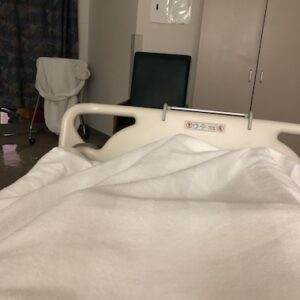“Saddle embolisms of pulmonary artery.” That’s what my discharge papers say.
 Neither the ER doctor nor the admitting doctor made the customary quip, “You’re lucky to be alive,” but another doctor from the congregation who came over to the house later to interpret all the diagnoses shook his head. “Good job still being alive,” he said. And he gave me a fist bump.
Neither the ER doctor nor the admitting doctor made the customary quip, “You’re lucky to be alive,” but another doctor from the congregation who came over to the house later to interpret all the diagnoses shook his head. “Good job still being alive,” he said. And he gave me a fist bump.
I know that life is precious and precarious, but that’s typically head knowledge. It’s another knowledge altogether when I’m in the ICU being poked and pumped with blood thinners or my husband is ranting around the house about the pharmacy that “tried to kill my wife.” So many people have since told me of their experiences with pulmonary embolisms (past tense), but a fair number have also approached me, rather stricken, to share about loved ones who died of the same. Precious and precarious indeed.
“In middle age,” writes Kieran Setiya in his book Midlife: A Philosophical Guide, “the limited span of human life is no longer an abstraction. You know from the inside what a decade means; those that remain to you can be counted on one hand.”
Setiya wonders if we can find comfort by internalizing the idea that the nothingness that precedes life is in no way different from the nothingness that follows life. He calls these two conditions “prenatal and postmortem nonexistence.” Hm. No. I do not find comfort there. He also examines the irrational desire for immortality, but ultimately finds no satisfying resolution to the fear of death. Live in the present, he concludes. It’s all you’ve got.
In the weeks just after my hospitalization, two men in our community died. Both were young, under fifty. I didn’t know either of them well enough, but no one grieves alone in a small town. Hearts were wrenched, and lives were turned inside out. I can’t imagine that Setiya’s “symmetry” of nonexistences would be much comfort to the friends and family who loved them either.
I find far more comfort in the funeral liturgy and its promises, when we pray, “Help us to live as those who are prepared to die, and when our days here are ended, enable us to die as those who go forth to live so that living or dying our life may be in Jesus Christ our risen Lord.” Yes.
I didn’t have time in those couple of days in May in the ER and the ICU to really ponder my existence too much. I did not, even for a moment, believe that I would not survive, but this sort-of sabbatical I’ve been on since then has been space to consider life and how short it is. I’m not worried, but I am making sure my family knows how to find my passwords. “Live as those prepared to die,” right?
Life is indeed precious and precarious, but the life to come in God is not. Thank goodness! And thank God.
Amen.



Amen!